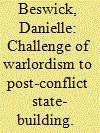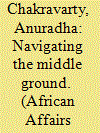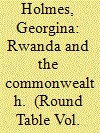|
|
|
Sort Order |
|
|
|
Items / Page
|
|
|
|
|
|
|
| Srl | Item |
| 1 |
ID:
089137


|
|
|
|
|
| Publication |
2009.
|
| Summary/Abstract |
Using evidence from the case of Congo, focusing in particular on the eastern Kivu provinces, this article argues that the enduring presence of warlords, and the influence of their international supporters, remains inadequately addressed by current practices of post-conflict state-building. The dominant contemporary model of state-building currently focuses on the promotion of liberal democracy as a way of avoiding future conflict, highlighting in particular the key role of elections. Simultaneously, it emphasises the importance of security and developing a state monopoly on violence. However, in the pursuit of both these ends in Congo, warlord politics and interference from regional powers continue to pose significant challenges. Exploring key aspects of the rebel movement led by Laurent Nkunda in east Congo (2004-2009), this article will illustrate some of the challenges warlordism poses in Congo, focusing particularly on the shortcomings of a 'single sovereign' approach to state-building. In conclusion, the experience of the Kivus indicates that an approach recognising multiple sovereignties or emphasising significant decentralisation may be more appropriate. Without such a shift in emphasis the notion that Congo is, or will soon become, an empirically functional state is perhaps wishful thinking.
|
|
|
|
|
|
|
|
|
|
|
|
|
|
|
|
| 2 |
ID:
133249


|
|
|
|
|
| Publication |
2014.
|
| Summary/Abstract |
Twenty years after the Rwandan genocide, little is known about the political values of non-elite Hutu. The post-genocide regime has emphasized the problem of "divisionism" and "genocide ideology", suggesting a popular preference for a radical stance on inter-group relations and reconciliation. This argument has been used to defer the question of democracy. This article investigates the attitudes of ordinary Hutu at a rural site, and shows that the respondents staked out a middle ground, emphasizing the shared interests of ordinary Hutu and Tutsi and distancing themselves from the political excesses of both Hutu and Tutsi elites. However, this moderate political space appeared to yield to more radical views when discussing the pressures of transitional justice, when respondents' careful distinction between elite and ordinary people collapsed and a monolithic actor, "the Tutsi", was imagined in conflict with "the Hutu". While this slippage appears to be a coping mechanism in the face of stressful situations rather than an inherent political preference, the article concludes that politically convenient assumptions and maladroit public policy risk contributing to the very dangers the regime claims to combat.
|
|
|
|
|
|
|
|
|
|
|
|
|
|
|
|
| 3 |
ID:
107088


|
|
|
|
|
| Publication |
2011.
|
| Summary/Abstract |
As with most British media coverage in 1994, the BBC did not report genocide in Rwanda, preferring instead to depict political violence as tribal civil war and 'primitive' ethnic conflict. Yet when the international community declared that genocide had taken place, the BBC was quick to change its tack, moving away from reporting ethnic conflict towards memorialising genocide. Referring to the BBC's website, political discussion programmes and documentary films, the article considers how over time an institutional narrative on the 1994 genocide has developed. The author argues that the BBC has been required to reconcile the problem of depicting genocide-conventionally seen as modern, 'Western' political violence-in Africa. The ways in which the BBC has remembered Rwanda's genocide also conceal from view British foreign policy decision-making between April and July 1994. The author then considers how, since Rwanda joined the Commonwealth in November 2009, the BBC's reporting has shifted again-this time towards framing news in the context of democracy and freedom of speech.
|
|
|
|
|
|
|
|
|
|
|
|
|
|
|
|
|
|
|
|
|